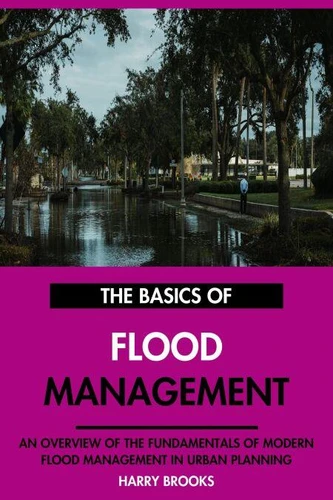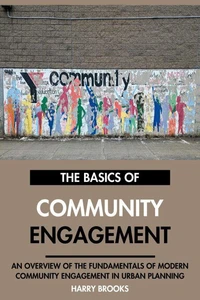Nouveauté
The Basics of Modern Flood Management: An Overview of the Fundamentals of Flood Management in Urban Planning.
Par :Formats :
Disponible dans votre compte client Decitre ou Furet du Nord dès validation de votre commande. Le format ePub protégé est :
- Compatible avec une lecture sur My Vivlio (smartphone, tablette, ordinateur)
- Compatible avec une lecture sur liseuses Vivlio
- Pour les liseuses autres que Vivlio, vous devez utiliser le logiciel Adobe Digital Edition. Non compatible avec la lecture sur les liseuses Kindle, Remarkable et Sony
- Non compatible avec un achat hors France métropolitaine
 , qui est-ce ?
, qui est-ce ?Notre partenaire de plateforme de lecture numérique où vous retrouverez l'ensemble de vos ebooks gratuitement
Pour en savoir plus sur nos ebooks, consultez notre aide en ligne ici
- FormatePub
- ISBN8231101733
- EAN9798231101733
- Date de parution12/08/2025
- Protection num.Adobe DRM
- Infos supplémentairesepub
- ÉditeurWalzone Press
Résumé
Flooding is a natural phenomenon that has significant implications for urban environments, particularly as climate change intensifies weather patterns and increases the frequency of extreme events. As cities expand and populations grow, the need for effective flood management becomes increasingly critical. This eBook aims to provide a comprehensive overview of flood management within the context of urban planning, exploring the fundamental principles, strategies, and challenges associated with this essential field. The significance of flood management cannot be overstated.
Floods can lead to devastating consequences, including loss of life, destruction of property, and long-term economic impacts. Urban planners play a pivotal role in mitigating these risks through thoughtful design and proactive strategies. This eBook is designed to equip readers with the knowledge and tools necessary to understand the complexities of flood management and its integration into urban planning. Throughout this eBook, we will delve into various aspects of flood management, beginning with the basics and progressing to more advanced topics.
Each chapter will explore specific themes, including risk assessment, land-use planning, community engagement, and the role of technology in flood management. By examining these topics in detail, readers will gain a deeper understanding of how to create resilient urban environments that can withstand the challenges posed by flooding. The importance of collaboration among stakeholders is a recurring theme in flood management.
Effective solutions require the involvement of government agencies, private sector entities, community organizations, and residents. This eBook emphasizes the need for a holistic approach that fosters partnerships and encourages shared responsibility in addressing flood risks. By working together, stakeholders can develop innovative strategies that enhance the resilience of urban areas and protect vulnerable communities. As we navigate the complexities of flood management, it is essential to recognize the dynamic nature of urban environments.
Climate change, population growth, and evolving societal needs necessitate a flexible and adaptive approach to flood management. This eBook will highlight the importance of integrating new technologies and data-driven decision-making into flood management practices, ensuring that urban planners are equipped to respond to emerging challenges. In conclusion, this eBook serves as a valuable resource for urban planners, policymakers, and anyone interested in understanding the fundamentals of flood management in urban planning.
By exploring the key concepts, strategies, and collaborative approaches necessary for effective flood management, readers will be better prepared to contribute to the development of resilient urban environments. The journey towards effective flood management is ongoing, and together, we can work towards creating safer, more sustainable cities that are equipped to face the challenges of flooding.
Floods can lead to devastating consequences, including loss of life, destruction of property, and long-term economic impacts. Urban planners play a pivotal role in mitigating these risks through thoughtful design and proactive strategies. This eBook is designed to equip readers with the knowledge and tools necessary to understand the complexities of flood management and its integration into urban planning. Throughout this eBook, we will delve into various aspects of flood management, beginning with the basics and progressing to more advanced topics.
Each chapter will explore specific themes, including risk assessment, land-use planning, community engagement, and the role of technology in flood management. By examining these topics in detail, readers will gain a deeper understanding of how to create resilient urban environments that can withstand the challenges posed by flooding. The importance of collaboration among stakeholders is a recurring theme in flood management.
Effective solutions require the involvement of government agencies, private sector entities, community organizations, and residents. This eBook emphasizes the need for a holistic approach that fosters partnerships and encourages shared responsibility in addressing flood risks. By working together, stakeholders can develop innovative strategies that enhance the resilience of urban areas and protect vulnerable communities. As we navigate the complexities of flood management, it is essential to recognize the dynamic nature of urban environments.
Climate change, population growth, and evolving societal needs necessitate a flexible and adaptive approach to flood management. This eBook will highlight the importance of integrating new technologies and data-driven decision-making into flood management practices, ensuring that urban planners are equipped to respond to emerging challenges. In conclusion, this eBook serves as a valuable resource for urban planners, policymakers, and anyone interested in understanding the fundamentals of flood management in urban planning.
By exploring the key concepts, strategies, and collaborative approaches necessary for effective flood management, readers will be better prepared to contribute to the development of resilient urban environments. The journey towards effective flood management is ongoing, and together, we can work towards creating safer, more sustainable cities that are equipped to face the challenges of flooding.
Flooding is a natural phenomenon that has significant implications for urban environments, particularly as climate change intensifies weather patterns and increases the frequency of extreme events. As cities expand and populations grow, the need for effective flood management becomes increasingly critical. This eBook aims to provide a comprehensive overview of flood management within the context of urban planning, exploring the fundamental principles, strategies, and challenges associated with this essential field. The significance of flood management cannot be overstated.
Floods can lead to devastating consequences, including loss of life, destruction of property, and long-term economic impacts. Urban planners play a pivotal role in mitigating these risks through thoughtful design and proactive strategies. This eBook is designed to equip readers with the knowledge and tools necessary to understand the complexities of flood management and its integration into urban planning. Throughout this eBook, we will delve into various aspects of flood management, beginning with the basics and progressing to more advanced topics.
Each chapter will explore specific themes, including risk assessment, land-use planning, community engagement, and the role of technology in flood management. By examining these topics in detail, readers will gain a deeper understanding of how to create resilient urban environments that can withstand the challenges posed by flooding. The importance of collaboration among stakeholders is a recurring theme in flood management.
Effective solutions require the involvement of government agencies, private sector entities, community organizations, and residents. This eBook emphasizes the need for a holistic approach that fosters partnerships and encourages shared responsibility in addressing flood risks. By working together, stakeholders can develop innovative strategies that enhance the resilience of urban areas and protect vulnerable communities. As we navigate the complexities of flood management, it is essential to recognize the dynamic nature of urban environments.
Climate change, population growth, and evolving societal needs necessitate a flexible and adaptive approach to flood management. This eBook will highlight the importance of integrating new technologies and data-driven decision-making into flood management practices, ensuring that urban planners are equipped to respond to emerging challenges. In conclusion, this eBook serves as a valuable resource for urban planners, policymakers, and anyone interested in understanding the fundamentals of flood management in urban planning.
By exploring the key concepts, strategies, and collaborative approaches necessary for effective flood management, readers will be better prepared to contribute to the development of resilient urban environments. The journey towards effective flood management is ongoing, and together, we can work towards creating safer, more sustainable cities that are equipped to face the challenges of flooding.
Floods can lead to devastating consequences, including loss of life, destruction of property, and long-term economic impacts. Urban planners play a pivotal role in mitigating these risks through thoughtful design and proactive strategies. This eBook is designed to equip readers with the knowledge and tools necessary to understand the complexities of flood management and its integration into urban planning. Throughout this eBook, we will delve into various aspects of flood management, beginning with the basics and progressing to more advanced topics.
Each chapter will explore specific themes, including risk assessment, land-use planning, community engagement, and the role of technology in flood management. By examining these topics in detail, readers will gain a deeper understanding of how to create resilient urban environments that can withstand the challenges posed by flooding. The importance of collaboration among stakeholders is a recurring theme in flood management.
Effective solutions require the involvement of government agencies, private sector entities, community organizations, and residents. This eBook emphasizes the need for a holistic approach that fosters partnerships and encourages shared responsibility in addressing flood risks. By working together, stakeholders can develop innovative strategies that enhance the resilience of urban areas and protect vulnerable communities. As we navigate the complexities of flood management, it is essential to recognize the dynamic nature of urban environments.
Climate change, population growth, and evolving societal needs necessitate a flexible and adaptive approach to flood management. This eBook will highlight the importance of integrating new technologies and data-driven decision-making into flood management practices, ensuring that urban planners are equipped to respond to emerging challenges. In conclusion, this eBook serves as a valuable resource for urban planners, policymakers, and anyone interested in understanding the fundamentals of flood management in urban planning.
By exploring the key concepts, strategies, and collaborative approaches necessary for effective flood management, readers will be better prepared to contribute to the development of resilient urban environments. The journey towards effective flood management is ongoing, and together, we can work towards creating safer, more sustainable cities that are equipped to face the challenges of flooding.














